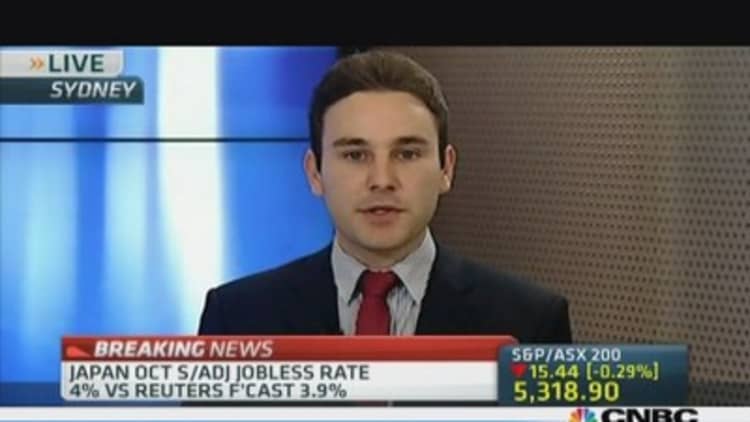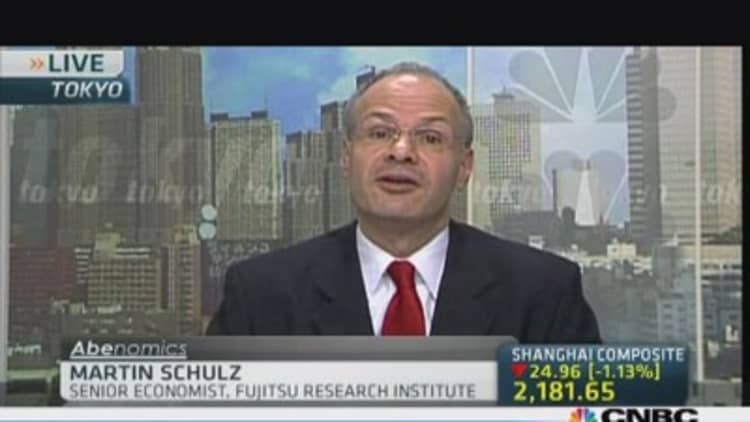The Bank of Japan will keep its highly expansionary monetary policy in place until inflation hits and stabilizes at its 2 percent target, the central bank's governor said on Thursday, adding it would take more easing measures if price rises flagged.
"We intend to achieve the 2 percent inflation target and maintain that in a stable manner," Haruhiko Kuroda told the Financial Times, suggesting ultra-easy money could remain in place well beyond the two-year time frame the BoJ has given itself to reach the goal.
(Read more: Japan economic package to total $182 billion)
"It's not good just to touch on 2 percent inflation and then go down to 1 percent or less than 1 percent."
Reversing years of deflation is a priority for both the bank and the government of Shinzo Abe, the prime minister, who has promoted monetary stimulus as the first "arrow" of his Abenomics campaign to stimulate Japanese growth.

Since his appointment by Mr Abe this spring, Mr Kuroda has committed the BoJ to buying some Y50 trillion of Japanese government bonds a year – a far more aggressive policy than his predecessors' and enough to double the country's monetary base by the end of next year.
On Thursday, he told the FT the current rate of JGB purchases would be enough to allow the BoJ to hit its inflation target on time, but that if the bank's models proved mistaken or the economy suffered an unexpected shock, "even before two years' time, we can adjust if necessary".
(Read more: Goldman most upbeat on Japan, Europe stocks in 2014)
Other central banks have implemented similar asset-buying schemes to support their economies since the global financial crisis, but the BoJ is in the unique position of having to battle a chronic fall in prices – some 15 years of deflation that Mr Kuroda said was "deeply embedded in the economy and society".
It has made progress: in October, the BoJ's favored measure of core inflation rose 0.9 percent, the fastest rate in five years. "Literally, we are almost half way," Mr Kuroda said.
Yet skeptics have noted that much of the inflation generated has been the result of a steep fall in the value of the yen, which has pushed up the cost of imports, most notably oil and gas.

Mr Kuroda acknowledged the role of "a depreciated currency" in the initial stages, but pointed to a recent rise in "core-core" prices – a measure that strips out the cost of food and energy – as evidence that inflation based on more sustainable local demand was taking hold.
"Now, the rise in the consumer price index reflects more domestic factors," he said.
He dismissed concerns that inflation could hurt Japan's commercial banks by pushing up long-term interest rates and savaging the value of their vast JGB holdings. Banks have slimmed their portfolios and shortened the average maturities of their remaining bonds, he said, and simulated "stress tests" conducted by the BoJ show they could withstand even an unlikely 3 percent increase in rates.
(Read more: BOJ talk spices up Japan markets)
Mr Kuroda also countered criticism that the bank's stimulus efforts could work too well and trigger runaway inflation. "We have enough tools to contain inflation from rising," he said, pointing to years of mild price rises in developed economies.
Compared with the task of reversing price declines, "to contain inflation from rising beyond the 2 percent target is less challenging."
More from the Financial Times:
Yen tumbles to lows as shorts grow
Fading Japanese market momentum frustrates investors
BoJ to ignore Fed's lead on tapering
Mr Kuroda, a former finance ministry official, reiterated his support for tighter fiscal policy to rein in Japan's huge government debt, which is approaching two and a half years' economic output. He reiterated his support for a planned doubling of the national sales tax, to 10 percent by 2015, and said further tax rises or spending cuts would be needed to meet a goal of eliminating the deficit, minus interest payments, by 2020.
Addressing concerns that higher taxes would hurt the economy and undo progress toward ending deflation, he said the effects would be "more manageable" – through fiscal and monetary stimulus – than a loss of investor confidence in government finances.
"If there is a JGB crisis, it's very difficult to manage the situation, not just for the government but for the central bank," he said. "That is the risk of postponing fiscal consolidation."

